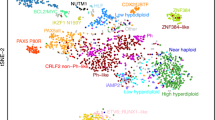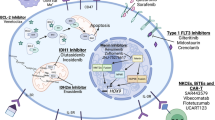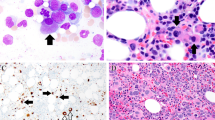Abstract
Study aims
To evaluate the outcomes of patients with 3q26.2/MECOM-rearranged chronic myeloid leukemia (CML).
Methods
We reviewed consecutive adult patients with 3q26.2/MECOM-rearranged CML between January 1, 1998 and February 16, 2023. Rearrangements of 3q26.2/MECOM were confirmed by conventional cytogenetics, and fluorescence in situ hybridization starting in 2015.
Results
We identified 55 patients with MECOM-rearranged CML, including 23 in chronic phase (CP) or accelerated phase (AP) and 32 in blast phase (BP). Nine patients (16%) achieved a major cytogenetic response (MCyR) or deeper. At a median follow-up of 89 months, median survival was 14 months. The 5-year survival rate was 19% overall, 23% in CML-CP/AP, and 15% in CML-BP. In the 6-month landmark analysis, the 5-year survival rate was 41% for allogeneic stem cell transplantation (allo-SCT) recipients versus 17% for non-recipients (P = 0.050). Multivariate analysis showed that the percentage of marrow blasts and achievement of MCyR or deeper could predict survival.
Conclusion
Outcomes of 3q26.2/MECOM-rearranged CML are poor despite the availability of multiple BCR::ABL1 tyrosine kinase inhibitors (TKIs). Third-generation TKIs in combination with novel agents and possible allo-SCT could be considered given the poor outcomes and resistance to second-generation TKIs.




Similar content being viewed by others
Data availability
The data are not publicly available to protect patient privacy. The data is potentially available upron request after the approval from the department and the institutional review boards.
References
Kimura S. Evolution of CML treatment. Int J Hematol. 2021;113(5):622–3.
Senapati J, Sasaki K, Issa GC, Lipton JH, Radich JP, Jabbour E, et al. Management of chronic myeloid leukemia in 2023 – common ground and common sense. Blood Cancer J. 2023;13(1):58.
Hochhaus A, Baccarani M, Silver RT, Schiffer C, Apperley JF, Cervantes F, et al. European LeukemiaNet 2020 recommendations for treating chronic myeloid leukemia. Leukemia. 2020;34(4):966–84.
Senapati J, Sasaki K, Issa GC, Lipton JH, Radich JP, Jabbour E, et al. Management of chronic myeloid leukemia in 2023 - common ground and common sense. Blood Cancer J. 2023;13(1):58.
Radich JP, Deininger M, Abboud CN, Altman JK, Berman E, Bhatia R, et al. Chronic myeloid leukemia, version1.2019, NCCN clinical practice guidelines in oncology. J Natl Compr Canc Netw. 2018;16(9):1108–11035.
Kantarjian H, Paul S, Thakkar J, Jabbour E. The influence of drug prices, new availability of inexpensive generic imatinib, new approvals, and post-marketing research on the treatment of chronic myeloid leukaemia in the USA. The Lancet Haematology. 2022;9(11):e854–61.
Jain P, Kantarjian H, Alattar ML, Jabbour E, Sasaki K, Nogueras Gonzalez G, et al. Long-term molecular and cytogenetic response and survival outcomes with imatinib 400 mg, imatinib 800 mg, dasatinib, and nilotinib in patients with chronic-phase chronic myeloid leukaemia: retrospective analysis of patient data from five clinical trials. Lancet Haematol. 2015;2(3):e118–28.
Hehlmann R, Lauseker M, Saussele S, Pfirrmann M, Krause S, Kolb HJ, et al. Assessment of imatinib as first-line treatment of chronic myeloid leukemia: 10-year survival results of the randomized CML study IV and impact of non-CML determinants. Leukemia. 2017;31(11):2398–406.
Kizaki M, Takahashi N, Iriyama N, Okamoto S, Ono T, Usui N, et al. Efficacy and safety of tyrosine kinase inhibitors for newly diagnosed chronic-phase chronic myeloid leukemia over a 5-year period: results from the Japanese registry obtained by the New TARGET system. Int J Hematol. 2019;109(4):426–39.
Morita K, Sasaki K. Current status and novel strategy of CML. Int J Hematol. 2021;113(5):624–31.
Nakamae H, Yamamoto M, Sakaida E, Kanda Y, Ohmine K, Ono T, et al. Nilotinib vs. imatinib in Japanese patients with newly diagnosed chronic myeloid leukemia in chronic phase: 10-year follow‑up of the Japanese subgroup of the randomized ENESTnd trial. Int J Hematol. 2023;115(1):33–42.
Sasaki K, Haddad FG, Short NJ, Jain N, Issa G, Jabbour E, et al. Outcome of Philadelphia chromosome-positive chronic myeloid leukemia in the United States since the introduction of imatinib therapy-the surveillance, epidemiology, and end results database, 2000–2019. Cancer. 2023;129(23):3805–14.
Sasaki K, Strom SS, O’Brien S, Jabbour E, Ravandi F, Konopleva M, et al. Relative survival in patients with chronic-phase chronic myeloid leukaemia in the tyrosine-kinase inhibitor era: analysis of patient data from six prospective clinical trials. Lancet Haematol. 2015;2(5):e186–93.
Bower H, Bjorkholm M, Dickman PW, Hoglund M, Lambert PC, Andersson TM. Life expectancy of patients with chronic myeloid leukemia approaches the life expectancy of the general population. J Clin Oncol. 2016;34(24):2851–7.
Bidikian A, Kantarjian H, Jabbour E, Short NJ, Patel K, Ravandi F, et al. Prognostic impact of ASXL1 mutations in chronic phase chronic myeloid leukemia. Blood Cancer J. 2022;12(10):144.
Schönfeld L, Rinke J, Hinze A, Nagel SN, Schäfer V, Schenk T, et al. ASXL1 mutations predict inferior molecular response to nilotinib treatment in chronic myeloid leukemia. Leukemia. 2022;36(9):2242–9.
Bidikian A, Jabbour E, Issa GC, Short NJ, Sasaki K, Kantarjian H. Chronic myeloid leukemia without major molecular response after 2 years of treatment with tyrosine kinase inhibitor. Am J Hematol. 2023;98(4):639–44.
Shahrin NH, Wadham C, Branford S. Defining higher-risk chronic myeloid leukemia: risk scores, genomic landscape, and prognostication. Curr Hematol Malig Rep. 2022;17(6):171–80.
Yoshimaru R, Minami Y. Genetic landscape of chronic myeloid leukemia and a novel targeted drug for overcoming resistance. Int J Mol Sci. 2023;24(18):13806. https://doi.org/10.3390/ijms241813806.
Wang W, Cortes JE, Tang G, Khoury JD, Wang S, Bueso-Ramos CE, et al. Risk stratification of chromosomal abnormalities in chronic myelogenous leukemia in the era of tyrosine kinase inhibitor therapy. Blood. 2016;127(22):2742–50.
Hehlmann R, Voskanyan A, Lauseker M, Pfirrmann M, Kalmanti L, Rinaldetti S, et al. High-risk additional chromosomal abnormalities at low blast counts herald death by CML. Leukemia. 2020;34(8):2074–86.
Hehlmann R, Lauseker M, Voskanyan A, Fabarius A, Haferlach C, Hochhaus A, et al. Impact of emerging ACA on survival in chronic myeloid leukemia (CML). Leukemia. 2022;36(10):2544–7.
Birdwell C, Fiskus W, Kadia TM, DiNardo CD, Mill CP, Bhalla KN. EVI1 dysregulation: impact on biology and therapy of myeloid malignancies. Blood Cancer J. 2021;11(3):64.
Sato T, Goyama S, Kataoka K, Nasu R, Tsuruta-Kishino T, Kagoya Y, et al. Evi1 defines leukemia-initiating capacity and tyrosine kinase inhibitor resistance in chronic myeloid leukemia. Oncogene. 2014;33(42):5028–38.
Vinothkumar K, Chanda S, Singh VK, Biswas S, Mohapatra S, Biswas G, et al. EVI1 upregulates PTGS1 (COX1) and decreases the action of tyrosine kinase inhibitors (TKIs) in chronic myeloid leukemia cells. Int J Hematol. 2023;117(1):110–20.
Wang W, Cortes JE, Lin P, Beaty MW, Ai D, Amin HM, et al. Clinical and prognostic significance of 3q26.2 and other chromosome 3 abnormalities in CML in the era of tyrosine kinase inhibitors. Blood. 2015;126(14):1699–706.
Ogawa S, Kurokawa M, Tanaka T, Tanaka K, Hangaishi A, Mitani K, et al. Increased Evi-1 expression is frequently observed in blastic crisis of chronic myelocytic leukemia. Leukemia. 1996;10(5):788–94.
Yin CC, Cortes J, Barkoh B, Hayes K, Kantarjian H, Jones D. t(3;21)(q26;q22) in myeloid leukemia: an aggressive syndrome of blast transformation associated with hydroxyurea or antimetabolite therapy. Cancer. 2006;106(8):1730–8.
Daghistani M, Marin D, Khorashad JS, Wang L, May PC, Paliompeis C, et al. EVI-1 oncogene expression predicts survival in chronic-phase CML patients resistant to imatinib treated with second-generation tyrosine kinase inhibitors. Blood. 2010;116(26):6014–7.
Paquette RL, Nicoll J, Chalukya M, Elashoff D, Shah NP, Sawyers C, et al. Frequent EVI1 translocations in myeloid blast crisis CML that evolves through tyrosine kinase inhibitors. Cancer Genet. 2011;204(7):392–7.
Khoury JD, Solary E, Abla O, Akkari Y, Alaggio R, Apperley JF, et al. The 5th edition of the World Health Organization Classification of Haematolymphoid Tumours: Myeloid and Histiocytic/Dendritic Neoplasms. Leukemia. 2022;36(7):1703–19.
Arber DA, Orazi A, Hasserjian RP, Borowitz MJ, Calvo KR, Kvasnicka HM, et al. International consensus classification of myeloid neoplasms and acute Leukemias: integrating morphologic, clinical, and genomic data. Blood. 2022;140(11):1200–28.
Saxena K, Jabbour E, Issa G, Sasaki K, Ravandi F, Maiti A, et al. Impact of frontline treatment approach on outcomes of myeloid blast phase CML. J Hematol Oncol. 2021;14(1):94.
Kantarjian HM, O’Brien S, Cortes J, Giles FJ, Faderl S, Issa JP, et al. Results of decitabine (5-aza-2’deoxycytidine) therapy in 130 patients with chronic myelogenous leukemia. Cancer. 2003;98(3):522–8.
Senapati J, Ravandi F, DiNardo CD, Issa GC, Sasaki K, Konopleva M, et al. A phase II study of the combination of decitabine, venetoclax and ponatinib in patients with Chronic Myeloid Leukemia (CML) in Myeloid Blast Phase (MBP) or Philadelphia-Chromosome Positive (Ph+) Acute Myeloid Leukemia (AML). Blood. 2022;140(Supplement 1):3880–2.
Acknowledgements
This work was partly supported by the University of Texas MD Anderson Cancer Center Support Grant CA016672, the University of Texas MD Anderson MDS/AML Moon Shot, the Charif Souki cancer research grant, Leukemia Texas (KS), Japan Cancer Society Relay For Life My Oncology Dream Award (HA), and The Uehara Memorial Foundation Research Fellowship (HA).
Funding
The University of Texas MD Anderson Cancer Center Support Grant, CA016672, The University of Texas MD Anderson Cancer Center MDS/AML Moon Shot, The Charif Souki cancer research grant, Leukemia Texas, Japan Cancer Society, Uehara Memorial Foundation
Author information
Authors and Affiliations
Corresponding author
Ethics declarations
Conflict of interest
HMK reported research funding from Shenzhen Target Rx, Pfizer, Novartis, Labcorp, KAHR medical, Ipsen Biopharmaceuticals, Curis, Biologix, Astellas, Ascentage, Amphista, Amgen, Abbvie, Stemline, Takeda, Daiichi-Sankyo, Immunogen, Jazz Pharmaceuticals, Bristol Myers Squibb, ARIAD, Astex Pharmaceuticals, Agios, Cyclacel, and honoraria from Shenzhen Target Rx, Pfizer, Novartis, Labcorp, KAHR medical, Ipsen Biopharmaceuticals, Curis, Biologix, Astellas, Ascentage, Amphista, Amgen, Abbvie, Stemline, Takeda, Precision BioSciences, ARIAD, Immunogen, Orsenix, Agios, Actinium Pharmaceuticals, outside the study. EJ reported research funding from Novartis, Hikma, Takeda, Pfizer, Genentech, Amgen, Astex, Adaptive Biotech, Ascentage, Bristol Myers Squibb, Abbvie, Jazz Pharmaceuticals, consulting fee from Novartis, Hikma, Takeda, Pfizer, Genentech, Amgen, Astex, Adaptive Biotech, Ascentage, Bristol Myers Squibb, Abbvie, Jazz Pharmaceuticals, and honoraria from Hikma, Takeda, Pfizer, Genentech, Amgen, Astex, Adaptive Biotech, Ascentage, Bristol Myers Squibb, Abbvie, outside this study. GI reported research funding from NuProbe, Novartis, Syndax, Astex, Merck, Kura Oncology, Celgene, Cullinan Oncology, and consulting fee from NuProbe, Novartis, Syndax, Kura Oncology, Abbvie, outside this study. NJS reported research funding from Stemline Therapeutics, Astellas, Takeda, and consulting fee from Novartis, Takeda, AstraZeneca, Pfizer, Amgen, and honoraria from Amgen, outside this study. MA reported research funding from Daiichi Sankyo, Brest Cancer Research Foundation, AstraZeneca, Oxford Biomedical UK, Eterna, SentiBio, Pinot Bio, Syndax, and advisory board fee from Cancer UK, Leukemia & Lymphoma Society, Aptose, German Research Council, NCI, CLL Foundation, Eterna, and stock or stock options from Reata, Aptose, Eutropics, SentiBio, Chimerix, outside this study. KS reported research funding from Novartis, EnLiven, consulting fee from Novartis, and honoraria from Otsuka Pharmaceuticals, Amgen, advisory board fee from Novartis, Pfizer, Daiichi-Sankyo, outside this study. The rest of the authors did not have conflicts of interest to report.
Additional information
Publisher's Note
Springer Nature remains neutral with regard to jurisdictional claims in published maps and institutional affiliations.
Supplementary Information
Below is the link to the electronic supplementary material.
About this article
Cite this article
Akiyama, H., Kantarjian, H., Jabbour, E. et al. Outcome of 3q26.2/MECOM rearrangements in chronic myeloid leukemia. Int J Hematol (2024). https://doi.org/10.1007/s12185-024-03787-z
Received:
Revised:
Accepted:
Published:
DOI: https://doi.org/10.1007/s12185-024-03787-z




